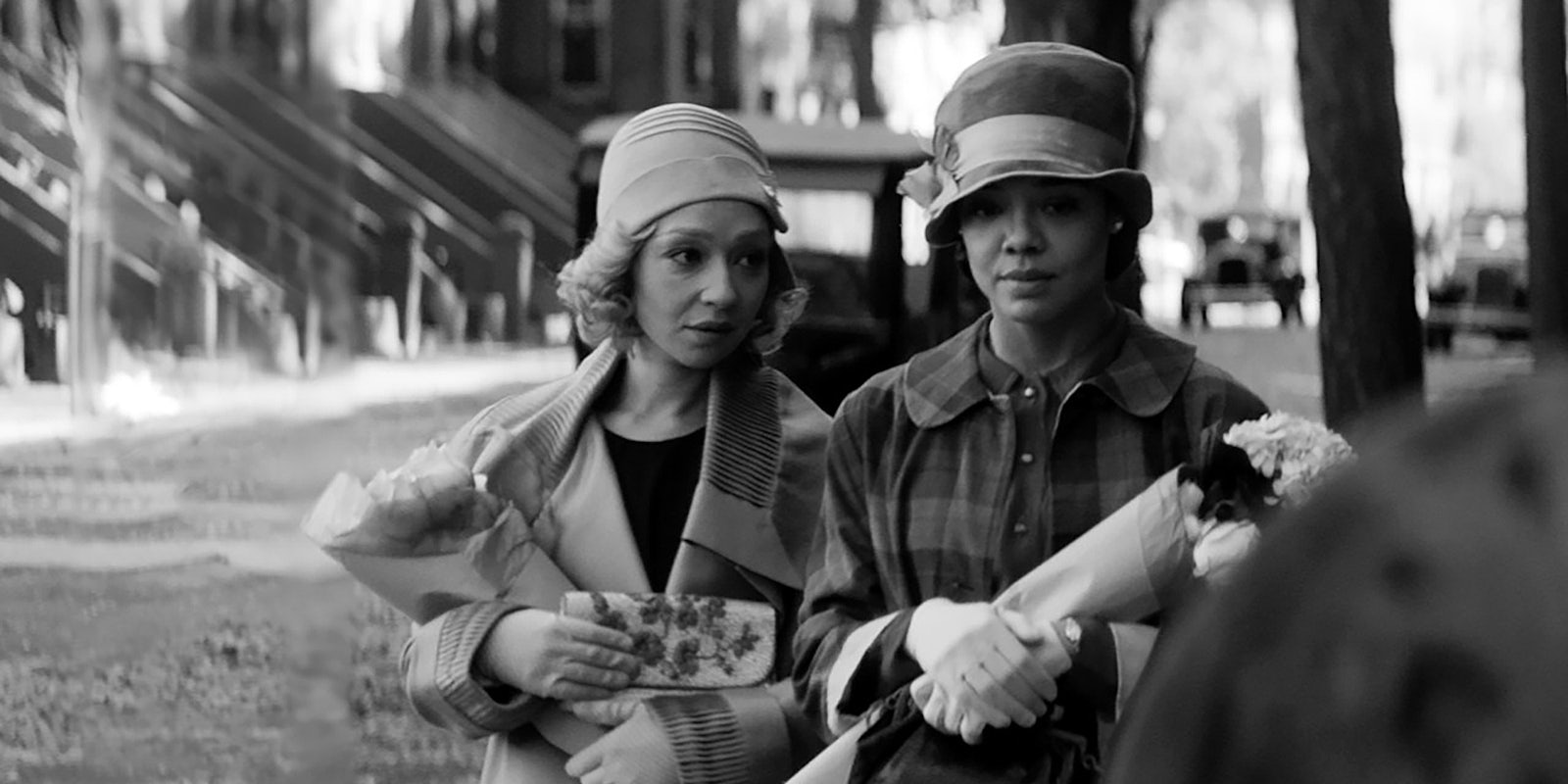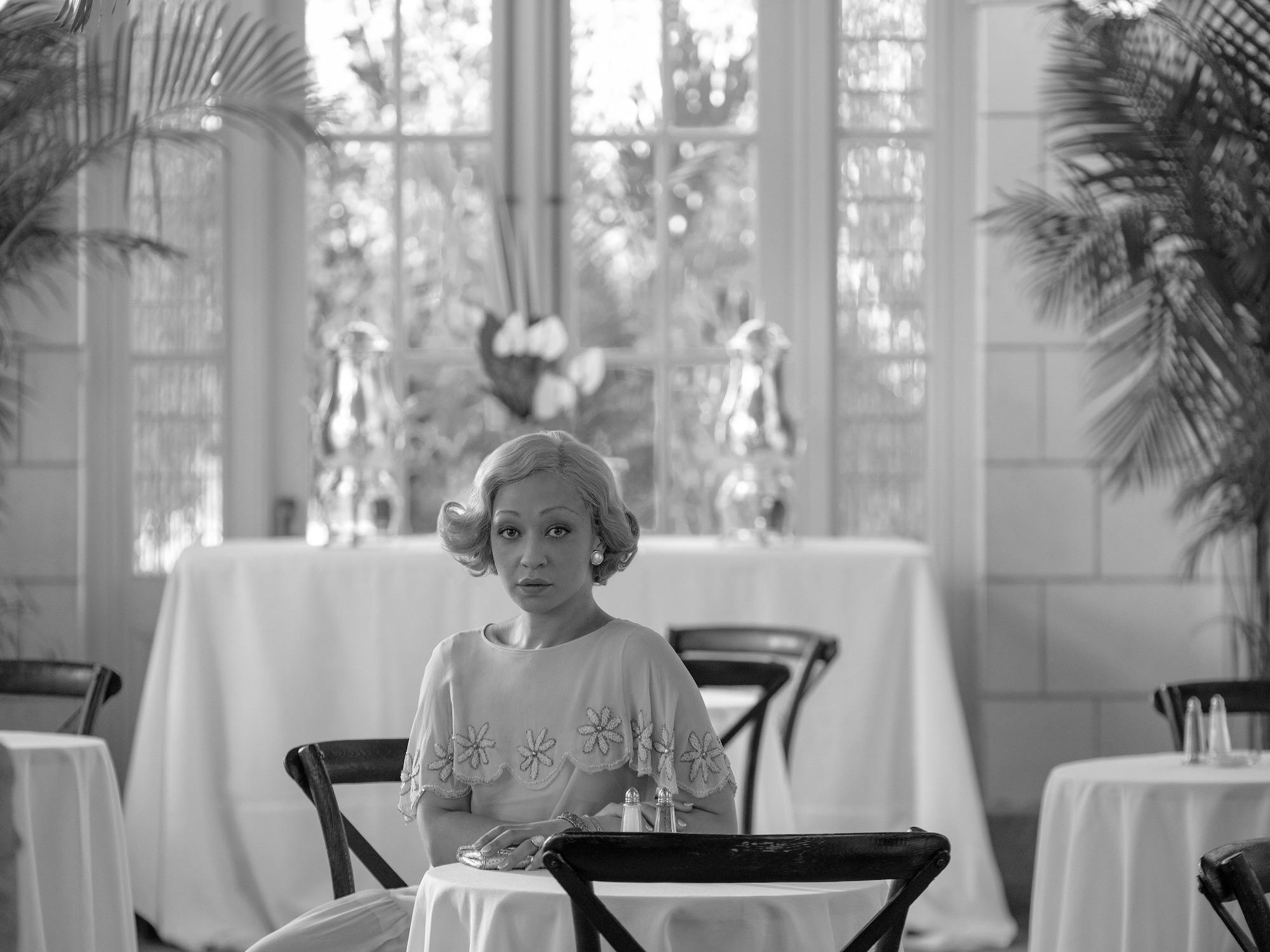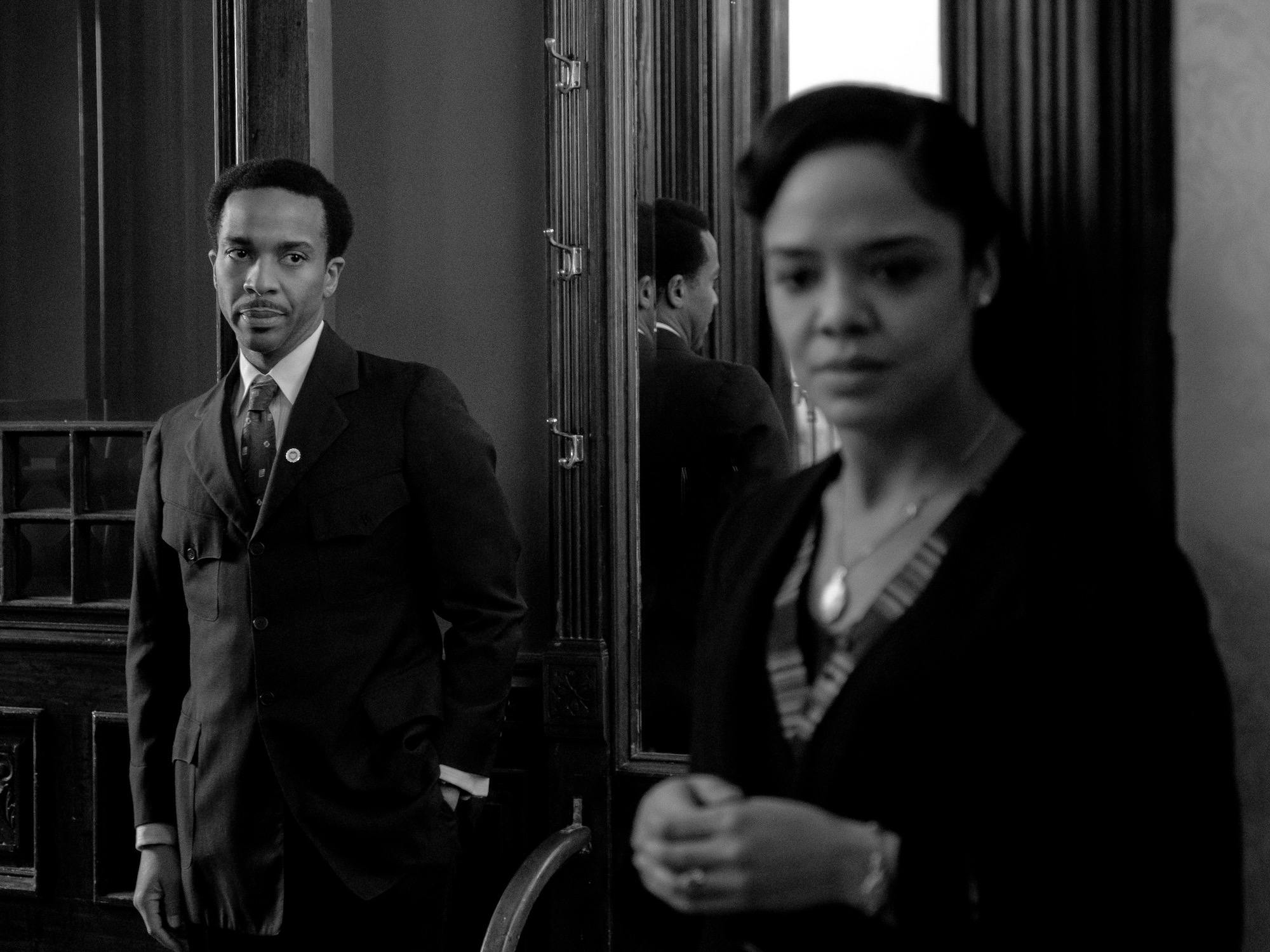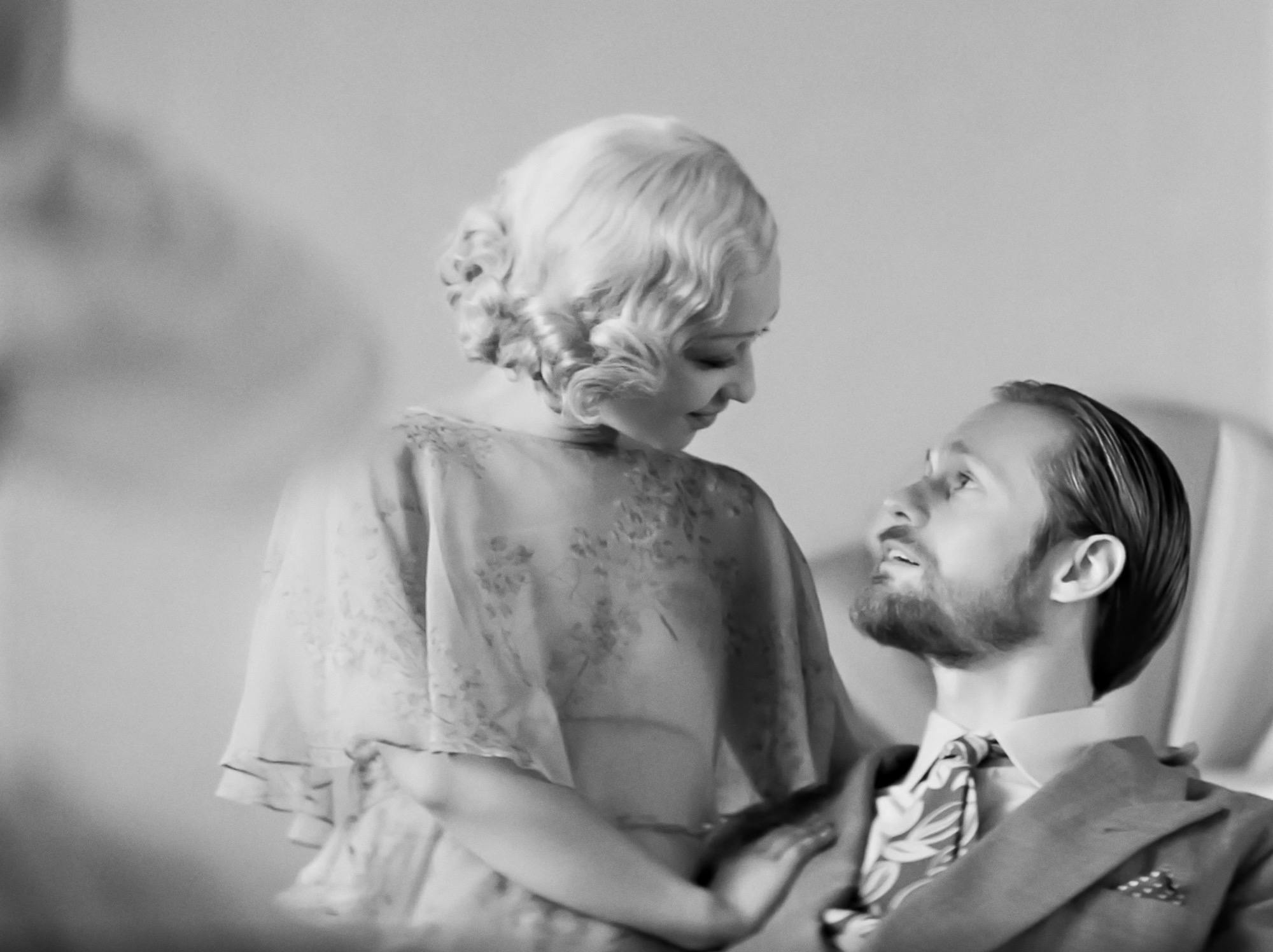Passing—the directorial debut of actress Rebecca Hall—is, like the Nella Larsen novel it’s adapted from, steeped in ambiguity. It’s got big ideas and complex conversations that can be as revealing as they are thorny amid the height of the Harlem Renaissance, and by its conclusion rife with tension, viewers might ultimately have more questions than answers. Captured in black-and-white and gorgeously shot by cinematographer Edu Grau, it’s grounded by nuanced performances from its two leads.
DIRECTOR: Rebecca Hall
STREAMING: Netflix
After a chance encounter 12 years after they last saw one another, two childhood friends—one “passing” as a white woman, the other living as a Black woman—become entangled in each other’s lives. Based on a 1929 novel by Nella Larsen, it’s a strong directorial debut for Rebecca Hall while Tessa Thompson and Ruth Negga shine.
From its 4:3 aspect ratio to an intimate view of 1920s New York City, Passing is an exercise in restraint. Even when we meet Irene Redfield (Tessa Thompson), a well-off housewife, she’s trying to make herself as small as possible. On a sweltering summer day, Irene is searching for a book for one of her sons, a futile task since the book isn’t in stock. But every interaction with someone in this part of segregated New York City, from fellow shoppers to the store clerk to the cab driver she eventually hails to take her to a hotel so she can have some tea on the rooftop restaurant, is nerve-wracking; she’s not comfortable, and the close-ups reflect that even further as she tilts her head down as much as she possibly can.
It’s with this frame of mind that Irene reconnects with Clare Bellew (Ruth Negga), someone she’s known since childhood but hasn’t seen for the past 12 years. Clare, too, is passing, but unlike Irene, Clare has spent almost all of that time passing into white society; Irene didn’t even recognize Clare—even when Clare called her by her old nickname, ’Rene—until Clare started to laugh. There are the pleasantries of catching up after 12 years apart, of course, but they retreat to Clare’s suite to be able to speak honestly.
The allure of the other person is evident from the get-go. Irene, whose dalliance with passing was for a specific purpose (and something that made her uncomfortable in that moment), has a loving husband in Brian (André Holland), a successful doctor, and two kids; Clare, who’s spent years passing as a white woman, married John (Alexander Skarsgård), a wealthy banker who travels a lot for work, and a daughter who’s often mentioned but never seen. Irene has a community, Clare has wealth. Irene is curious about Clare’s life passing at first while Clare is downright envious of Irene’s connection with the Black community that Irene is part of. Their meeting is ultimately enough to drive home that Irene wants nothing more to do with Clare, but Clare weaves her way into Irene and Brian’s lives anyway, chasing after a community she left behind.
Passing is something of a slow burn. Time passes by, usually marked by the weather and how many leaves are on the tree in front of Irene and Brian’s brownstone or the soft melody of Emahoy Tsegué-Maryam Guèbrou’s “The Homeless Wanderer,” a composition that already heightened the 2020 documentary Time. Whenever John is out of town (and he is often out of town), Clare goes up to Harlem to visit Irene and embed herself in Irene’s social life, whether it’s to join a bridge game or attend a social event. Even when their interactions remain pleasant all the while, Irene and Clare dance around each other, the queer undertones in every action even if it’s never acted upon—one early interaction includes a letter from Clare to Irene that could, in a way, double as a love letter—up until it sours.
Those conversations usually come back to race. Hugh (Bill Camp), a white intellectual who frequents Black social events, looks on Clare (once he’s informed that she’s passing) like someone to study, and several characters touching on cultural appropriation or the idea that Hugh uses the Black communities he associates with for ideas in his writing would fit right at home in 2021. Brian is worried about his sons and reports of lynching in the newspaper, but Irene would rather not talk about it. There are even some displays of classism and colorism in the way that Irene talks to and treats Zulena (Ashley Ware Jenkins), a dark-skinned Black woman who works for the Redfields; at one point, Irene seems annoyed that Zulena went home to see her family instead of staying to look after her kids.
But the elephant in the room is John Bellew, who wears his racism on his sleeve; in their first meeting, he informs Irene (who he doesn’t know is Black) with a smile that he doesn’t dislike Black people, he hates them. The threat of what would happen to Clare if John were to find out that his wife was Black hangs over every interaction; sometimes it’s explicit, other times less so. “Safe?” Clare says early on. “I don’t even know what that means anymore.”
The tightrope which Passing has to walk is thin; is in less deft hands, so much could go wrong. Hall, who wrote the script, sticks closely to Larsen’s prose, both with its dialogue and its ambiguity, something that may ultimately frustrate some viewers. Her direction is crisp, and as Hall has noted in interviews, she also had a personal connection to the story through her maternal grandfather, a Black man who passed as white. Thompson and Negga are both fantastic, and while Negga has the showier role as a woman chasing after something she once threw away, Thompson is just as captivating while portraying Irene’s many nuances. It’s a strong debut for Hall, bolstered by the many pieces that bring a book from nearly a century ago with timeless relevancy.
Passing premiered at the New York Film Festival on Oct. 3. It is now streaming on Netflix.





